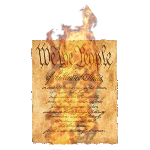
I realize there’s an ongoing … issue … that may be more interesting, but I don’t have any new thoughts on that problem that I want to write today and this topic has been bothering me for a while.
We need some rules around executive pardons.
As things stand right now, the President’s pardon ability has no constraints on it other than that it only applies federally.
This basically gives the President the ability to send minions out to commit (federal) crimes with impunity, since they can always be pardoned. Heck, we even allow them to be pardoned in advance.
Which is less than ideal.
So, when the current crisis is behind us or when we start writing the constitutions of whatever State(s) come into being after the U.S. dissolves, we need to consider some boundaries to the executive pardon.
Here’s my list:
- no pardoning yourself
- pardons can only be issued for acts of which a person was convicted
- pardons must cite specific acts which are being pardoned
- pardons must be announced publicly to take effect
There are probably more ways this power can be abused that no one’s even thought of yet, but this list at least addresses the ways it’s been abused (or suggested it could be abused) lately.
It’s a bare minimum, at least.
Because without at least these rules, the federal pardon power is far too open to abuse.
- AIpocalypse: Generative AI Cannot Be Reliable - 2026-02-13
- C’mon Democrats: Zero Votes For Fascism - 2026-02-11
- Digital Sovereignty: Not Just For Countries - 2026-02-09
- Failed Constitution Check: The Professoriat Weighs In
- Build Back Smaller: The United States Was Too Big
- The Old Dog Needs Some New Tricks: Learning From The Laboratories Of Democracy
- High Crimes And Misdemeanors: Everything He Does Is Illegal, So Is He Really President?
- Spreading It Around: One Person, One Job
